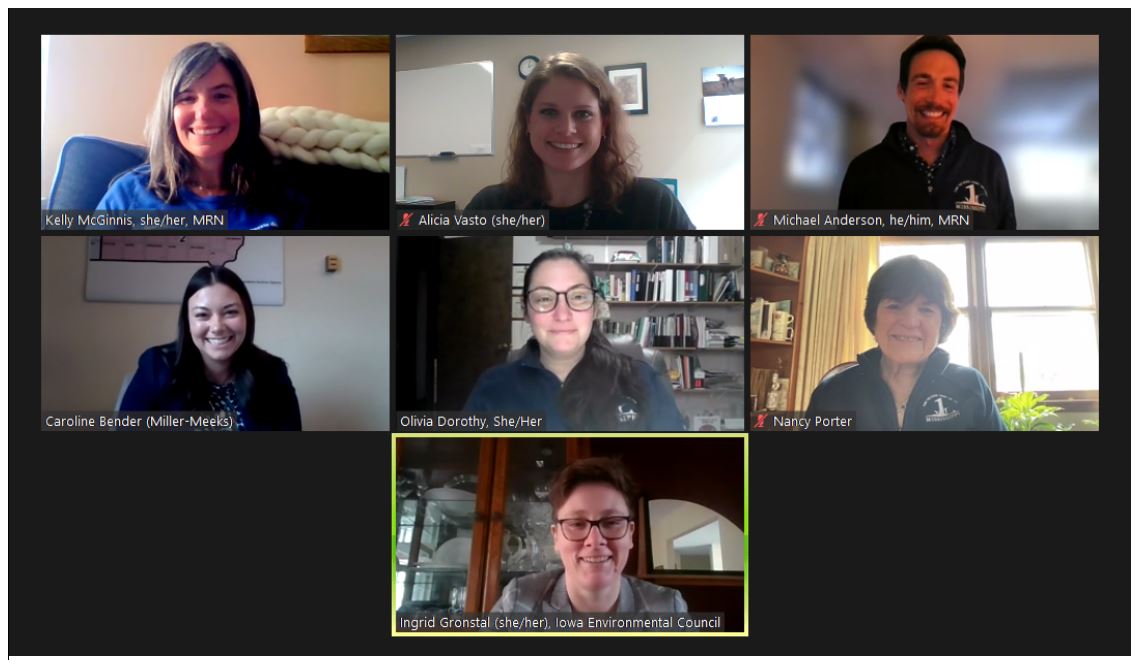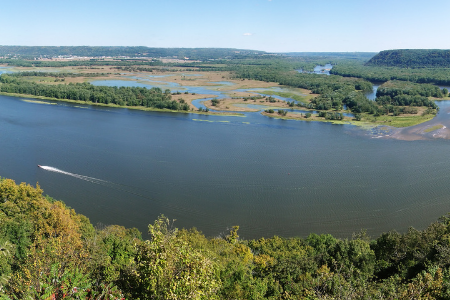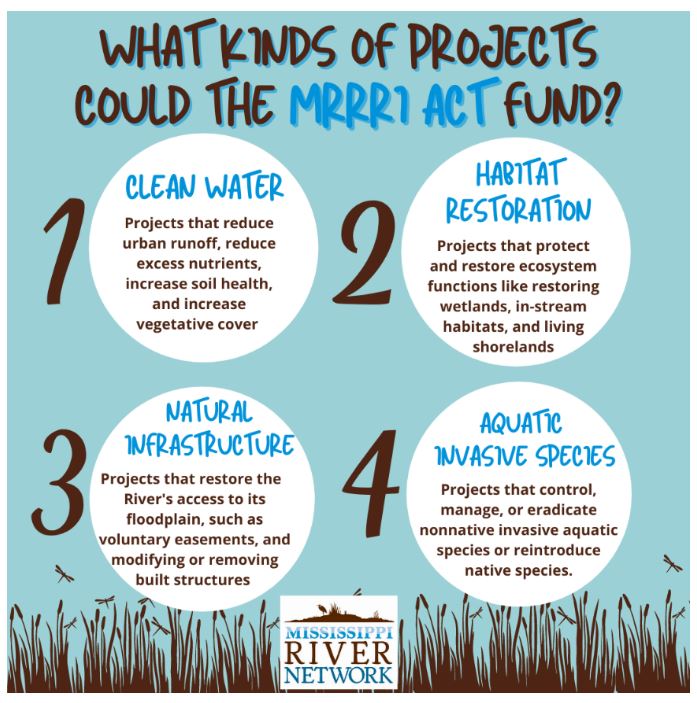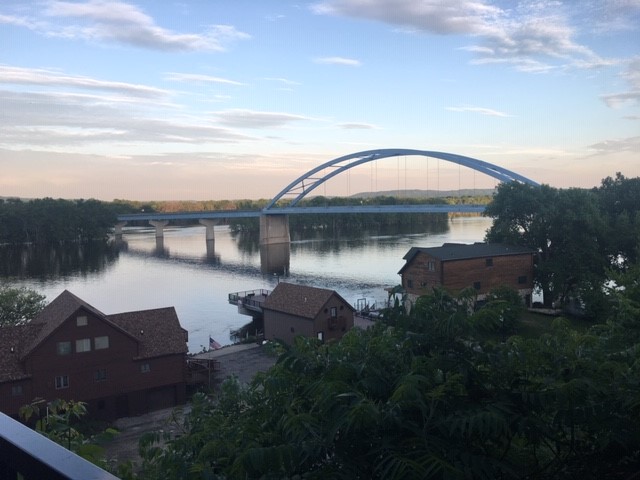IEC and MRN "Fly In" to Washington to talk about Flooding, Healthy Habitats, and Funding for Our River Communities
posted
on Tuesday, April 12, 2022
in
Water and Land News
Maisah Khan, Policy Director, Mississippi River Network
Alicia Vasto, IEC Water Program Associate Director
Last month, Mississippi River Network (MRN) member organizations, including the Iowa Environmental Council, sprang into action for an annual DC “fly-in” event. Over the span of one week, we engaged 25 Congressional offices in all ten mainstem Mississippi River states with participation from 16 MRN member organizations!
During the virtual fly-in meetings, we shared what was important to MRN member organizations such as IEC, as well as River Citizens. We asked Congressional offices to:
- Prepare for floods and droughts before they’re an emergency,
- Create one dedicated federal program to protect our one Mississippi River, and
- Support funding for sustainable agriculture, healthy habitats, and thriving River communities in Congress’ next budget.
We’ll dig into what we talked about, but first…
What is a “fly-in” anyway?
A “fly-in” is an opportunity for our staff and members to speak directly to Congressional offices in Washington, DC about issues that are important to us. It’s how our Senators and Representatives in Congress know about what is happening at home in the communities they represent.
In previous years, we packed our bags and flew in from our River cities and states to visit with staff on Capitol Hill face-to-face. This was our fourth time hosting a fly-in in a virtual format, but we’re hopeful we can return to meeting safely in-person in 2023.
MRN has member organizations like IEC and River Citizen supporters all up and down the Mississippi River corridor. You can find an MRN member organization near you by looking at this map. We met with Congressional offices that represent Iowans, Minnesotans, Louisianians, and everyone in between. For example, in Iowa, we met with staff for Sen. Joni Ernst, Rep. Ashley Hinson, and Rep. Marianette Miller-Meeks.

IEC and MRN representatives meeting virtually with Rep. Miller-Meeks' staff during the virtual DC Fly In.
We met with Congressional staff who primarily focus on environment, agriculture, transportation, and infrastructure issues. These are the people who make sure that their bosses (our Congressional decision-makers) have all the best info before making policy and legislative decisions.
3 things we wanted Congress to know about the Mississippi River
1. We need to prepare for floods and droughts BEFORE they’re an emergency.
The best time to plan for flooding is when it isn’t happening. Even though the National Weather Service and other agencies predict a near-normal flood season in 2022, too many River communities know all too well that we need to prepare for floods before an emergency situation.
Our proactive solution is to focus on restoring healthy habitats along our River. We know that functioning habitats (like healthy rivers, reconnected floodplains, and restored wetlands) are powerful tools our rivers naturally have that reduce flood and storm damages. Restoring these features protects river communities from flood losses and is often more cost-effective than levees and floodwalls.
Those healthy habitats also bring many other improvements to our communities; places with vibrant ecosystems also enjoy improved water quality, more wildlife, and better recreation opportunities for everyone. There are as many economic benefits as environmental benefits to habitat restoration.
We can think of these healthy habitats as “green infrastructure,” “nature-based solutions,” or “natural infrastructure.” No matter what you call it, they are strategies we can implement now to protect us from future floods and droughts.
We asked Congressional offices to include more ways to invest in these healthy habitats through the 2022 Water Resources Development Act (WRDA). We also shared that the Infrastructure Investment and Jobs Act (IIJA) passed last year presents an opportunity to make proactive investments in our states that better prepare us for flooding.
2. We are 1 Mississippi; it’s time we had one program for its protection.
 Other treasured American waterways like the Great Lakes, Puget Sound, and the Chesapeake Bay already enjoy the benefits of dedicated federal programs. Their geographic programs bring restoration and resilience dollars to the states involved and enjoy bipartisan support year after year.
Other treasured American waterways like the Great Lakes, Puget Sound, and the Chesapeake Bay already enjoy the benefits of dedicated federal programs. Their geographic programs bring restoration and resilience dollars to the states involved and enjoy bipartisan support year after year.
Surprisingly, our nation’s greatest river has no such dedicated program. We think it’s time to change that. We are 1 Mississippi, after all; it’s time we had one program for its protection.
The Mississippi River Restoration and Resilience Initiative (or MRRRI) would create a similar geographic program for the 10 mainstem Mississippi River states. MRRRI would fund projects in clean water, habitat restoration, natural infrastructure, and aquatic invasive species. The infographic below shows a few examples of the kinds of projects MRRRI might fund under each of these four categories.

A bill to authorize MRRRI (H.R. 4202) was introduced last summer. We thanked our Congress people who have already supported the idea of a new program for the Mississippi River by co-sponsoring the legislation, and we asked others to join in support by signing on.
You can read more about MRRRI and learn about the current co-sponsors by visiting: http://mississippiriver.org/mrrri
3. We support funding for healthy habitats and thriving River communities in Congress’ next budget.
Finally, we asked Congressional offices to better support sustainable agriculture, healthy river habitats, and thriving Mississippi River communities as it considers its Fiscal Year 2023 (FY23) Congressional budget.
We talked about our support for the National Sustainable Agriculture Coalition’s agriculture FY23 appropriations bill requests related to the Sustainable Agriculture Research and Education (SARE) program and the Grazing Lands Conservation Initiative (GLCI).
We also expressed support for American Rivers’ FY23 River Budget, which outlines clear priorities for federal spending to improve water infrastructure, restore watersheds, and modernize flood management.
3 Things We Learned from This Fly-In:
1. Getting to know your Congressional offices and their staff makes a meaningful impact in the long run.
Developing relationships with Senators, Representatives, and their staffers takes time and is a process that pays off in the future. Even for River Citizens supporters like you, your advocacy can be more meaningful if you reach out early and often to get to know your decision makers or their staff. It can be as easy as introducing yourself and sharing your interests. That way, when you ask your Congressperson to act on an issue you care about later on, they may be more likely to respond.
The annual nature of the fly-in allows MRN members to regularly meet with Congressional staff that work on Mississippi River issues. This repetition helps develop relationships over time, creates familiarity with the issues presented so we can deepen the conversation in the future, and establishes MRN members as a trusted resource.
We mentioned our community of 20,000 River Citizens in all of our meetings, so if you decide to reach out to your Congressional offices most should already know who you are! (If you aren’t yet a River Citizen, join the community for free today: bit.ly/RiverCitizen)
2. We are all connected by our appreciation for the River.
When talking with Congressional offices, our appreciation for the Mississippi River and love of the outdoors are two easy places to start a conversation. We can connect quickly and easily over our shared geography and experiences no matter who we are talking to. Many of us have experienced the same floods or droughts, visited the same beloved state parks, or enjoyed the same River-side attractions. Connecting over these shared values and interests creates an atmosphere of problem-solving and collaboration.
The solutions to our water issues aren’t always simple and agreed-upon, but the connection to water is universal.
3. The issues facing our River are as diverse our River communities.
 From floods to droughts, fertilizer pollution to invasive species – the issues we are asking our federal leaders to address are not only diverse and large-scale, but they are also pressing and urgent.
From floods to droughts, fertilizer pollution to invasive species – the issues we are asking our federal leaders to address are not only diverse and large-scale, but they are also pressing and urgent.
We also know that some River communities have been impacted more than others by environmental harms. All along the Mississippi River, communities of color and under-resourced communities have experienced the disproportionate impacts of pollution and climate change. You can see just how these factors overlap in MRN’s Flood Risk and Poverty Map.
If you live in the Mississippi River basin, you are already experiencing the impacts of the climate crisis. It’s time for every voice to join the chorus of advocates for our River. Advocacy is an ongoing process that needs all of us.
Now, it’s your turn to “phone-in!”
The good news is – it’s easy for you to join us and make an impact. If you and just 9 other River Citizens make a phone call today, you will have made the same impact as one of our fly-in meetings. We’ve heard from Congressional staff that receiving 10 phone calls from you -- their constituents – has the same impact as one in-person or virtual meeting.
The River Citizen community is 20,000-people strong. If just 250 people take the time to make a phone call to their Congressional decision maker, you will have had the same impact as our entire annual fly-in event!
It’s easy and meaningful. You can join us through the click-to-call action or click-to-email action up on our Action Center. You will be guided through the whole process step-by-step, and you’ll be building on the messages we carried during our meetings.
Needing a little bit of inspiration to make the call or email? Here are some quotes from our MRN Members who participated in the 2022 virtual fly-in meetings:
- The MRN fly-in makes it easy to connect with our federal leaders on issues critical to the Mississippi River.
- The MRN fly-in is an opportunity that I look forward to every year. IEC focuses primarily on state-level policy, but it is helpful to join with MRN and its members to speak with our federal delegation about important policies for the health of the Mississippi and all of our River Citizens. Maisah and the MRN team do a fabulous job of organizing and coordinating the meetings so that they run smoothly and professionally. Thank you all so much!
- It was a joy to talk to many of our state Congressional offices about opportunities to restore Missouri's great rivers and make river communities more resilient to flooding and climate change. Regardless of where you live in Missouri, healthy rivers are fundamental to our health, environment, and economies.
- The fly-in is a great experience and presents an annual opportunity to connect or reconnect with our Congressional delegation. It's something we do not have the capacity to organize ourselves, so MRN's role in facilitating is greatly appreciated.
- clean water
- flooding
- resiliency